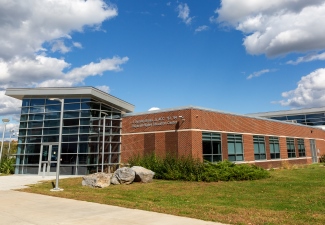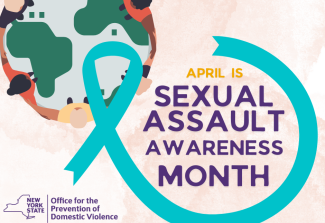SUNY Plattsburgh Faculty Organize, Judge Regional Science Fair
About 30 students from schools around the North Country gathered at SUNY Plattsburgh in late April for the Champlain Valley Regional Science Fair.
The group, which also included home-schooled students, gathered in the Warren Ballrooms of the Angell College Center with prepared poster boards, research papers and demonstrations ready to present their original research to a panel of judges.
The regional science fair started in the 1990s. It was revived around 2008 by Dr. Robert Fuller, retired Center for Earth and Environmental Science director, and Michelle Snyder, former associate dean of academic affairs at Clinton Community College.
Dr. Ed Romanowicz, professor of geology, and Michael Lawliss, a science lab technology assistant at Clinton Community College,
have co-chaired the event since 2015.
Seven SUNY Plattsburgh faculty members volunteered their time to judge the experiments and Dr. Meg Pearson, dean of the School of Arts and Sciences, was master of ceremonies.
‘Getting into Research Early’
Kaelyn Dekalb ’26, a geology major from Granville, N.Y., was tabling for the Northcountry Planetarium.
“It’s awesome to see that those kids are getting into research on different topics so early. I can see one about light that has to do with physics,” Dekalb said. “It’s great to see potential STEM majors, especially with all the women here.”
‘More Prepared for College’
Alexis Hathaway and her friend Katharine Roy, both senior at Peru High School, tied with another group for third place.
“We’re very excited about this, and we’re very prepared,” Hathaway said before the
judging. “We practiced a lot.”
Roy said that members of her generation can sometimes lack confidence in face-to-face interactions, and this experience helped her with that.
The pair said they each felt more comfortable entering college, having competed in the science fair, especially since they plan to enter research or the health care field.
Faculty Research Inspires Students
The research of Dr. Nancy Elwess, SUNY Plattsburgh distinguished teaching professor of biological sciences, inspired their project’s topic. Elwess assisted Hathaway and Roy with some instruction and ingredients they needed for their experiment.
Roy and Hathaway took DNA cheek swabs from 30 high school test subjects and used a PCR machine to magnify the DNA to see if there would be any difference in a gene that codes for balance, blood pressure regulation and heart function in long-distance versus short-distance runners.
‘Carrying Out Science’
First place went to Luke Moffett, a Peru High School senior.
His project tested which sealants would best waterproof a wooden kayak. Moffett had a small tank of water at his table where he demonstrated which materials caused water to bead off the wood most easily.
Moffett said he hopes to be a college professor someday.
“I really enjoy research so after I get some degrees I would probably end up working at a university carrying out my own research,” Moffett said. “It’s really all about carrying out science instead of just learning about it.”
He said the science fair has helped him feel more prepared for when he starts college at Dartmouth in the fall.
“I’ve definitely become more familiar with the scientific process in general,” Moffett said, adding that he wrote a 20-page research paper summarizing his findings.
Explore Future Career Aspiration
Grace Scherer moved to the North Country from Charleston, S.C., last fall. Her research measured light absorption when transmitted through variety atmospheric gases.
“I learned that I’m pretty sure this is what I want to do with my life,” Scherer said. “I love this, and it’s pretty much set in stone that research in terms of physics and astronomy, that’s where I find I’m happiest.”
Scherer said that her preparation for presenting to the judges helped her with stuttering, something she’s struggled with at times.
“I’ve talked more, I’ve developed a plan and I don’t stutter as much as I used to,” she said.
Scherer said her research also helped develop time management skills since the only classroom with a ventilation hood was available only for two to three hours after school.
‘Future Job Interview Preparation’
Lawliss and Romanowicz said that in addition to scientific inquiry skills, the fair develops interpersonal skills the students will use most of their lives.
“They’re talking to the judges who are almost all adults … presenting their areas. I see that as helping them with job interviews in that they have to talk to people who are well above their position.”
— Photos, Story By Assistant Director of Communications Felicia Krieg
News
Alumni Celebrated for Sustained Support of North Country, Residents

SUNY Adirondack Students Benefit from New Dual Agreement with SUNY Plattsburgh Queensbury

SUNY Recognizes Two Plattsburgh Seniors for Excellence in Academics, Leadership
